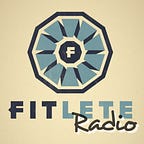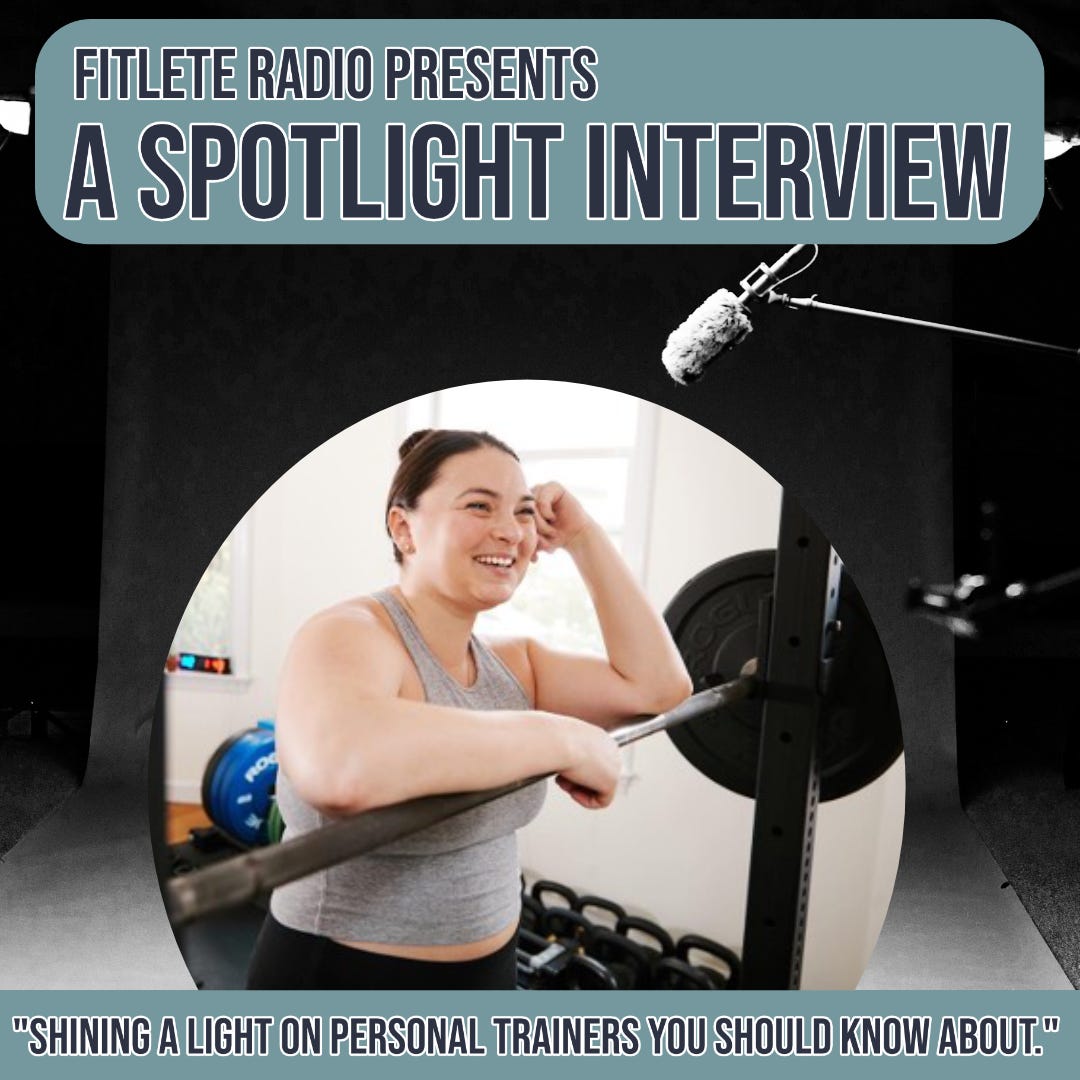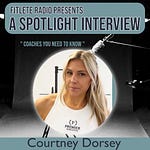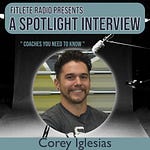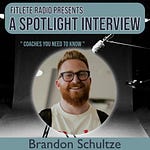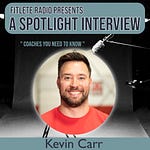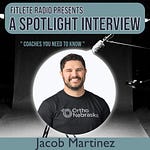We get to know Sarah Polacco in this Trainer spotlight episode of FITLETE Radio.
GEORGE: Introduce yourself and tell us a little about what you do and your background.
Hey everyone, my name is Sarah Polacco. I own S&P Fitness. I live in Medford, Massachusetts, which is just outside of Boston. I have been in the fitness industry now for, I think, 11 years. I think we're getting close to 12 years. It's at that point now where I'm like, okay, maybe I might just stop counting. And I absolutely love working in the fitness industry. When I was younger, in college, I bounced around from major to major. My actual major is language, culture, and world trade, with like a focus in some kind of like global finance or some shit like that. It's a lot of fancy words and it doesn't really mean much, but what I decided when after college is I really wanted to go back and get into fitness. I've always wanted to just help people feel good about themselves, feel strong. I also really wanted to be active in my job, and so this has just fulfilled really all those desires for me. As I've grown throughout the years and really gone on a journey figuring out my own mental health, I have also wanted to make sure that I make my coaching space a really safe place for people. I realized how important mental health was to everyone that was coming in. As I was doing intake forms, it was over and over and over again, people would be like, I'm here for my mental health. I want to feel better about myself physically and emotionally, and so that is what I really try to do, is create a safe space where if you're having a rough day, that's fine. You can be in whatever state you're in and we can approach your workout in whatever way feels best for you that day, and I like to try to help teach people how they can do that, how they can calibrate their workout, and maybe if they're feeling good, okay, let's punch it up. Let's go for it, and if they're not feeling as good, okay, maybe we bring it back down, like just listening to your body more. So that's a bit about me and my business.
GEORGE: Tell me a funny or interesting story about yourself that help's us get to know you as a human.
Okay, it took me a while to think of a funny or interesting story, and I was worried for a minute that I wasn't funny or interesting. But I think I came up with a good one, so here you go. Two years ago, I decided I really need to escape the winter here in Massachusetts, and I was going to spend a whole month in Puerto Rico. So the first week, I was there with two of my friends, and we go on this excursion. It's the second day that we're there. And this excursion, they take you into the jungle of Puerto Rico, and they literally take you to someone's house. And when we get there, they have the cutest dog and the cutest little puppy. And I am a huge dog lover, so I bend down, I start snuggling these dogs, and our guide goes, They're adoptable. And I'm just like, oh my god, she's so cute. What an adorable little nugget. And so we go on this excursion. We're like gallivanting in the jungle. We're climbing. We're doing things on ropes. We're in waterfalls. It's amazing. It's wonderful. We come back to this family's house, and they give us this beautiful lunch, this beautiful spread. And I'm still thinking about this adorable little puppy. And my friend goes, what are you going to name her? And my other friend's like, oh my god, that's it. It's done. So I gave her the name of Lettie. And basically, the guide told me I could contact them and let them know if I was interested. And so I wasn't allowed to have the dog at my Airbnb, so I had to wait until the end of the trip. But in the last two days of the trip, I was able to get Lettie. And I had to hide her in my Airbnb for two days. It was a very, very stressful thing the last couple days in getting her to the US, which is a whole other story. But I was able to bring her home, and she is my little baby Lettie. She is still a jungle dog. She's absolutely nuts, but she's such a sweetheart. And I love her so much. And I hope that story was interesting. Maybe not funny, but I hope it was interesting.
GEORGE: What strategies do you use to attract and retain clients in your personal training business?
So this is an interesting question because for a huge chunk of my career, I worked at a gym where I didn't really have to think about what are the strategies that we're going to use in order to bring people in, but we very much did have to think about the quality of the service. So you know, how good we were at coaching and creating a community. And that did help not only bring people in, but also retain people. So that has led me in working for myself to think about the same thing of like, how can I create the best experience possible for this person coming in? So I try to think of from beginning to end, to all the bits in between of how can I create the best experience for them? How can I make sure people feel safe and feel comfortable? How can I make sure that they're feeling listened to, that they're attaining their goals, that they're enjoying the program, that they're moving safely through everything? Those are all bits of how can I be the best coach that I possibly can. I know for beginner coaches, that can feel frustrating because sometimes you want like, okay, you do A, B, and C, and then you'll get clients. But truly, it's just like fitness program where you need to kind of like take your time, be the best that you can be, and those results will come over time. Now I will say that, that has really held true for a lot of my in-person coaching, but I am trying to expand more into more online coaching. And that has forced me to have to think a little bit about getting clients in different ways. Now, in whatever techniques I'm using, or whatever strategies I'm using, I do always think about what are my personal values and what are my business values, and those for me are one and the same. I need to think about what feels good for me, and what do I want to make sure, what message do I want to make sure the person is getting from me? I want to make sure that I don't feel icky, that I don't feel like I'm taking advantage of people, that I'm not feeling like really weirdly salesy, that I just want to be like, this is who I am, this is my product, and if this is a good fit, then wonderful. If it's not, then I'm also happy to pass you along to someone who's a better fit for.
GEORGE: What is your process for assessing a new client's fitness level and addressing their goals?
So when I sit down with a potential new client, I do a 30 to 45 minute call and I ask them questions like, how do they hear about me? What are their fitness goals? And then I like to have clarifying questions of what does that look like to you? So someone might say something like, I want to feel stronger. I want to feel more flexible. And I might be, I might want to ask, what does that look like to you? Or how will your life look differently? If you've attained this, if you say, like, I feel strong, what will you be able to do that you can't do now? So just having more clarifying questions so that you're both very clear on what that means. I also really like to ask why it's important. So even if they've kind of already said, like, I want to be stronger and more flexible, so that way I can play with my kids better. I might reiterate, you've already said that this is important for playing with your kids and for aging or whatever it may be. Tell me a little bit more about why this is so important to you. And I like that clarifier for myself, but also for them. It helps make things really clear for them as well. The next question I also really like to ask, which I think it might not be as common of one, is how do you relate to fitness and movement? And just the way someone answers this question can tell me a lot about a person. So someone might go into, like, their relationship with a sport and how and their identity relating to that sport. Someone might go into talking about their body and how they've struggled with self-confidence or how they look and their appearance. Someone might have a much shorter answer and just be like, I like working out and it feels good to me. And so just by, again, how they answer that question can really tell me a lot about themselves. Now in terms of actually doing a fitness assessment, I really have gone away from doing it because I start most people with a lot of the similar moves and then I scale it to them pretty quickly. I know in the beginning I think it does help to have that screening system, but for me, I just don't necessarily find it as important right now at this level.
GEORGE: What certifications do you hold, and how do you stay updated on the latest fitness trends and research?
There are so many ways to keep learning as a coach, and whether it's books, podcasts, certifications, talking with other coaches, I think the more important piece is to actually just keep on doing it. I've definitely seen coaches in the past who get to a certain point and they just kind of seem like they're done learning. Like they're sort of like, oh, I've done enough and I'm good to go. And they kind of like knock down new ideas and just kind of become like grumpy. And I knew from a young coaching age that I didn't want to become that. And so I do try to always continue learning in many different ways. Now, I mean, I could list out different certifications and books and stuff like that, but I think that would be kind of boring. So I'll tell you one thing that I have found really helpful lately is talking with PTs and developing relationships with different PTs. I remember when I was a younger coach, another coach told me that, again, they'd learned a lot from PTs. And I was like, well, how do you create that relationship? And they said, get injured. And I don't recommend that, but I have gone through different issues and I have created relationships with different PTs and through each different thing that's popped up. So like I broke my leg, I'm dealing currently with endometriosis and pelvic floor dysfunction. So I'm working with a pelvic floor PT. I've worked with other PTs who have worked with my clients. So talking with them as well about my clients' issues, I've learned so much through them. And also creating that relationship is so important. So that way you can create a better experience for your client. So that would be just one recommendation I would give. If there's a way that you can contact and make some relationships with some really good PTs that you can trust, and that way you can work together, you can bounce ideas off of one another, and again, be there for your clients. So don't get injured, but if you do, try to see it as an opportunity for you to learn more.
GEORGE: How do you envision your personal training business evolving in the next few years?
Okay, so I'm really excited about the future of my business. Now, I picture myself always doing some kind of in-person personal training because I do feel like you just gain so much knowledge from it and it keeps like a sharper eye, I think. That's just me personally, but what I really, really want to move forward in is talking more about mental health and fitness. Now, if any of you have ever followed me on Instagram or gotten my newsletter, you would know that I am someone who does talk a lot about mental health and what I would love to do, what I am currently working on, is creating a course that is for mental health informed coaching. I do think that there is such a strong bond between mental health and physical health and we know this. We know that people come in to see us because they want to improve their mental health, right? But I also think that a lot of people don't necessarily know how to accurately and most helpfully talk to someone who's dealing with mental health issues. I also think we have a hard time creating boundaries. Sometimes we want to talk about it. Sometimes we want to help so much that we actually kind of lose a little bit of the boundary and the line as a coach and as a client. So that is what I am working on, is I really want to create a course to help people understand how to communicate better with individuals who are dealing with mental health struggles, how to understand the perspective a little bit more. Oftentimes we get hung up on, like, why can't this person just do this and be like, well, if they're experiencing, you know, this specific type of mental health issue, something that seems really easy to you might be really difficult for them. So creating more of that understanding, teaching people more how to just be a better coach for those who are experiencing mental health challenges. So that's what I see the future of my business going.
GEORGE: What do you think are the biggest challenges currently facing the fitness & personal training industry?
One of the biggest challenges that's currently facing the fitness industry is something I think that has just continued to be a challenge for a long time and I don't actually see it really changing that much is the fact that we live in just a capitalistic hellscape. It keeps people in a place where they feel like they need to sell something and then people feel like they need to buy something. So let me clarify what I mean is that with training right like it's actually most of stuff is actually like pretty basic. For a large majority of people we want to get them moving in foundational ways. We want them to be doing things that make them feel good. If you're into the nutrition side like we want to help them eat foods that are like nutritionally dense in a way that feels good for them. A lot of that is not really sexy. It's hard to sell a lot of things along with that. So in order to make more money a lot of people in the fitness industry have created lots of stuff. So like these juices or pills or supplements or different ridiculous pieces of equipment. Like there's so many things that people create in order to sell because again we live in capitalism and people need to make money. On the other end people feel like they need to buy these things because they are then pressured and felt like well if I need if I'm gonna accomplish my goals if I'm gonna be healthy I need this thing. But that's not really the truth. Maybe some people won't like this answer but it's honestly what I think is the truth. A lot of health and wellness advice I think is actually way simpler than we make it. We need to focus more on like the big rocks and not the small pebbles. And I'm gonna keep on working on that but I also just think it's gonna continue to keep on being a problem.
Want more Sarah Polacco in your life? You can find her here:
S&P Fitness: https://www.sarahpolacco.com/
Purposeful Strength Podcast: https://soundcloud.com/purposefulstrength
Instagram: https://www.instagram.com/sarahpolacco/


